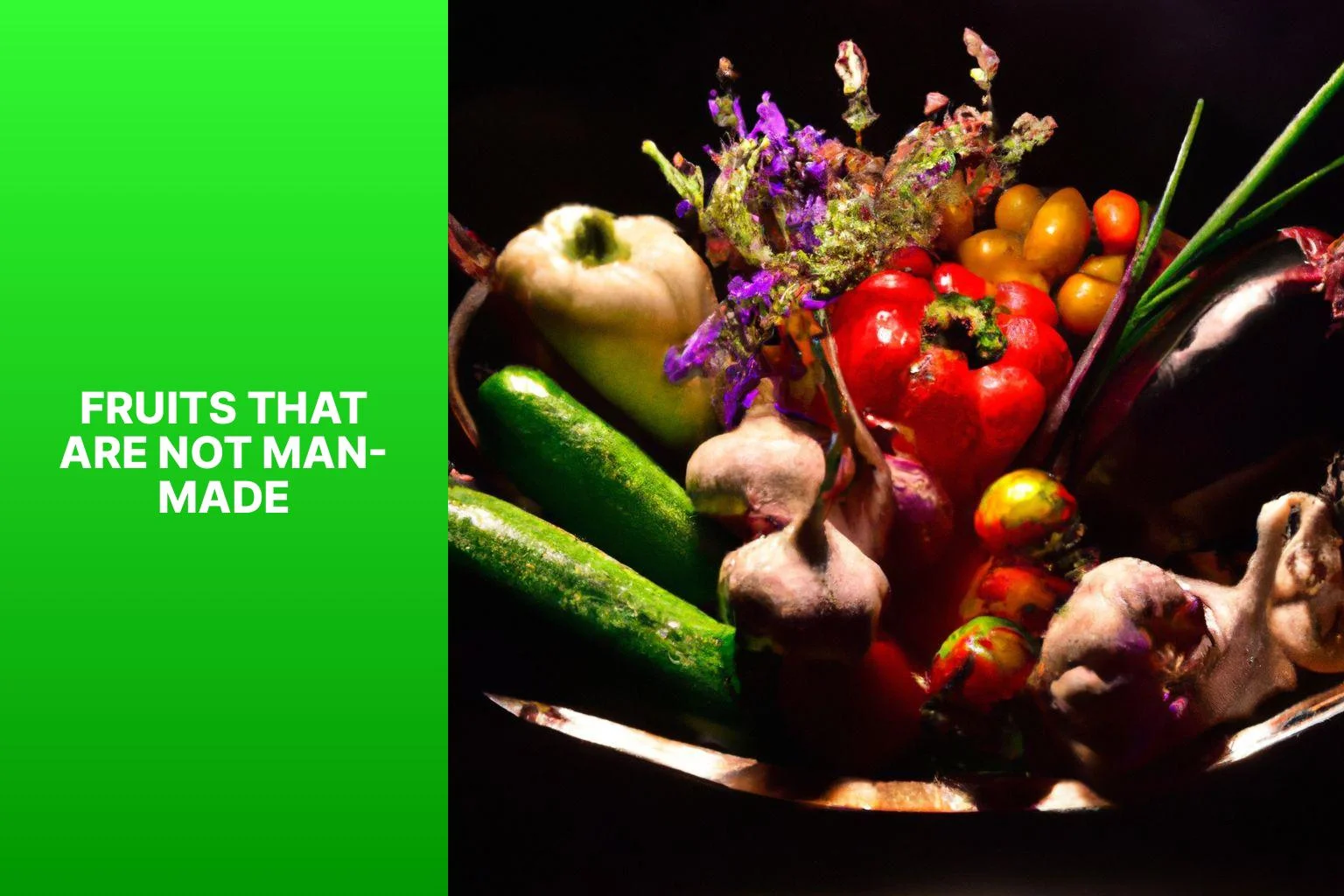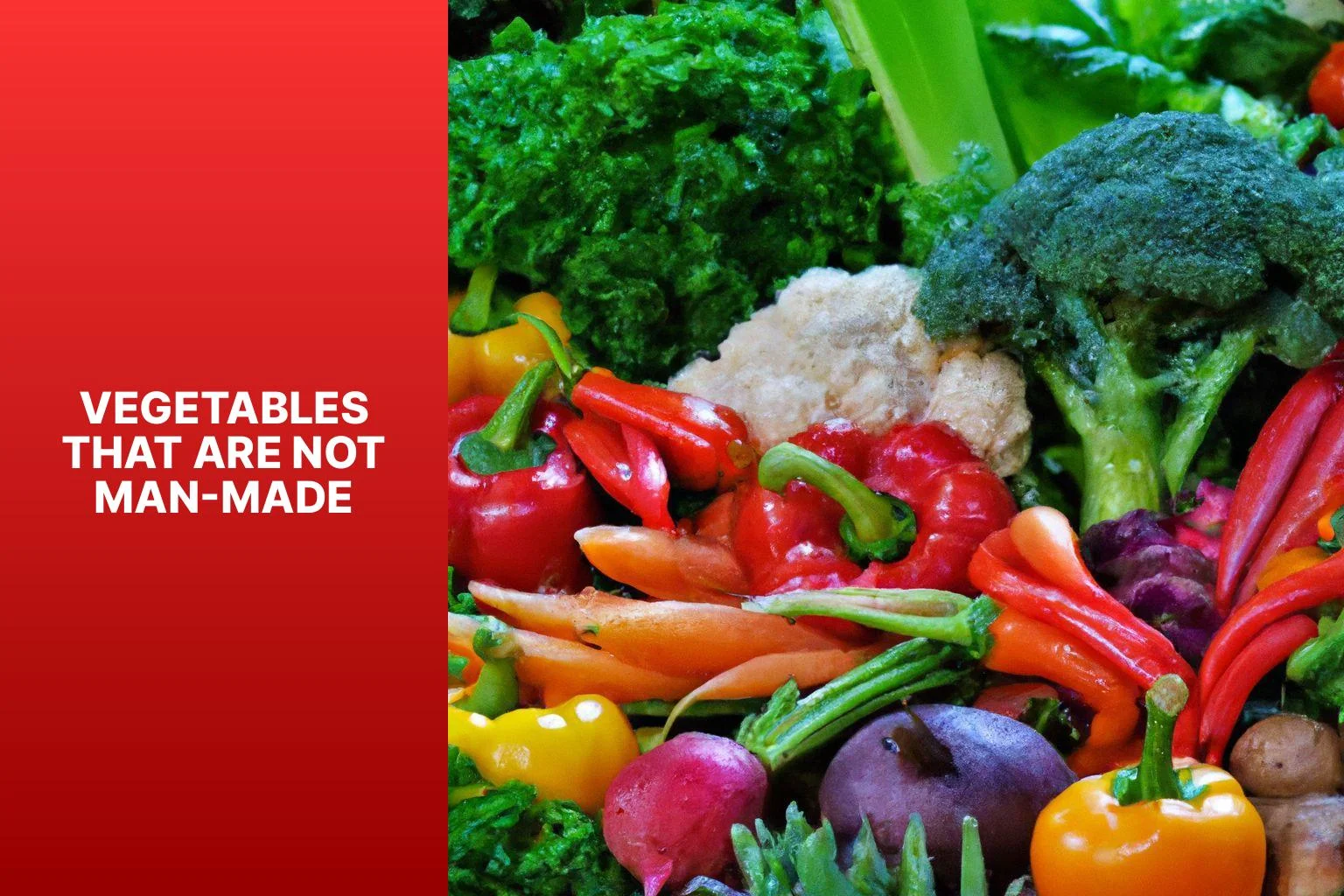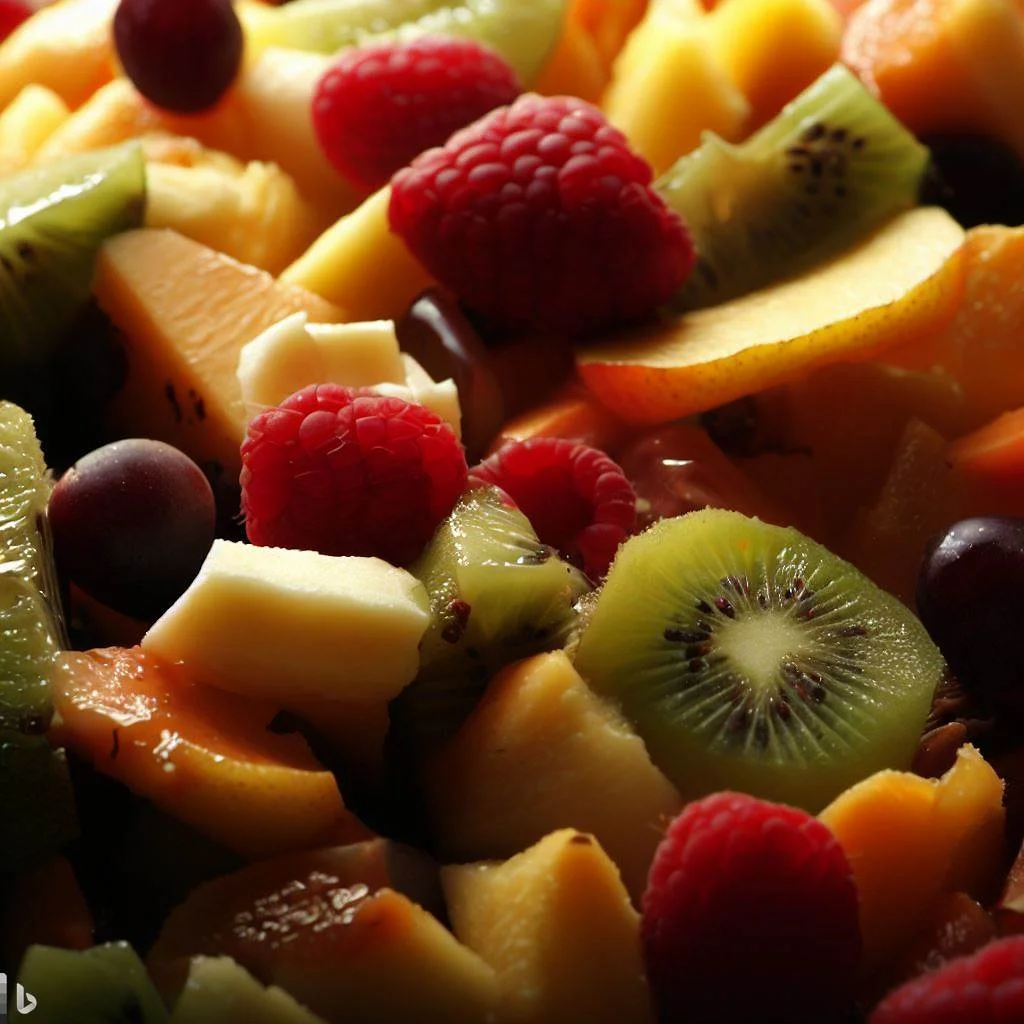Natural fruits and vegetables play a crucial role in our overall health and well-being. In a world where genetically modified and hybridized produce is becoming more prevalent, it is essential to understand which fruits and vegetables are truly natural and not man-made. This article aims to provide an introduction to natural fruits and vegetables, define what man-made produce is, and highlight some specific examples of fruits and vegetables that are not man-made.
Man-made fruits and vegetables are those that have undergone genetic modification or hybridization processes to alter their characteristics, such as size, color, taste, or shelf life. These processes involve manipulating the plant’s genetic material to achieve desired traits.
Fruits like apples, bananas, strawberries, and oranges are examples of fruits that are not man-made. They have evolved naturally over thousands of years through cross-pollination and the dispersal of seeds by animals.
Similarly, certain vegetables like carrots, broccoli, spinach, and tomatoes are considered natural as they have been cultivated and consumed by humans for centuries without genetic modification or hybridization.
Understanding which fruits and vegetables are not man-made is essential because natural produce tends to have higher nutritional value, better taste, and greater diversity of nutrients. They are often rich in vitamins, minerals, antioxidants, and dietary fiber. natural fruits and vegetables help support biodiversity and sustainable farming practices.
By choosing natural fruits and vegetables, we can make informed decisions about the food we consume and contribute to a healthier and more sustainable food system.
Key takeaway:
- Natural fruits and vegetables are those that have not been genetically modified or hybridized. They are products of natural processes and have not been altered by human intervention.
- Genetic modification and hybridization are two methods through which man-made fruits and vegetables are created. These techniques involve altering the genetic makeup of the plants to create desired traits.
- Some fruits that are not man-made include apples, bananas, strawberries, and oranges. These fruits have evolved naturally over time and have not been selectively bred or genetically modified by humans.
- Similarly, some vegetables that are not man-made include carrots, broccoli, spinach, and tomatoes. These vegetables have existed in their natural form for many years and have not undergone any significant genetic modifications by humans.
- Natural fruits and vegetables are important because they preserve biodiversity and contain a wide range of nutrients. By consuming natural produce, we support the conservation of traditional plant varieties and enjoy the full nutritional benefits of unaltered food.
What are Man-Made Fruits and Vegetables?
Discover the fascinating world of man-made fruits and vegetables. We’ll take a closer look at the processes of genetic modification and hybridization, exploring how these techniques have shaped the fruits and vegetables we encounter today. Get ready to unravel the secrets behind these artificially created delights and gain insights into the advancements made in agricultural practices. Join us on this journey where science meets nature to redefine what we thought we knew about our favorite produce.
Genetic Modification and Hybridization
Genetic modification and hybridization play vital roles in altering the characteristics of fruits and vegetables. Through genetic modification, the DNA of a plant is changed by incorporating specific genes from another organism, ultimately resulting in the emergence of new traits that do not occur naturally. On the other hand, hybridization involves crossbreeding different plant varieties to produce offspring that possess desirable traits.
These innovative methods have significantly contributed to the development of new cultivars that exhibit improved qualities. Genetic modification, for instance, enables the creation of crops that are resistant to pests and diseases. Consequently, this leads to increased yields and reduces the dependence on pesticides. Alternatively, hybridization contributes to the production of plants with enhanced flavor, color, and extended shelf life.
Nevertheless, it is important to address the concerns associated with genetic modification and hybridization. Many individuals express worries about the safety of genetically modified organisms (GMOs) and the potential environmental impact that modified genes may have on ecosystems. The practice of hybridization can result in a loss of genetic diversity and the disappearance of traditional plant varieties.
Fruits That Are Not Man-Made

Photo Credits: Fruitsveges.Com by Benjamin Nguyen
Discover the incredible world of fruits that have not been altered by human intervention. From the classic apple to the tropical goodness of bananas, the vibrant allure of strawberries, and the refreshing taste of oranges, these natural wonders have remained untamed by human cultivation. Exploring these unique fruits will transport you into the untouched beauty of nature’s craftsmanship. Get ready to savor the flavors and uncover the fascinating stories behind these non-man-made fruits.
1. Apples
While hiking in an apple orchard, I came across a tree filled with ripe, juicy apples. Apples are a top choice among natural fruits for several reasons. Plucking one and taking a bite, I instantly felt refreshed by its crispness and sweetness, providing a burst of natural energy.
Apples are packed with essential vitamins and minerals like vitamin C, potassium, and dietary fiber, making them rich in nutrients. They also make a great snack option for those watching their calorie intake since apples are low in calories, containing no fat or cholesterol.
Apples are versatile and can be enjoyed in multiple ways. They can be eaten raw, added to salads, baked into pies, or turned into applesauce. With numerous types of apples available, each with its own flavor and texture, such as Granny Smith, Fuji, Honeycrisp, and Gala, there’s always a different variety to explore.
Eating apples regularly has several health benefits, promoting good health. Apples may support heart health, aid in digestion, and help with weight management. This simple pleasure of enjoying a delicious and nutritious apple straight from nature while hiking reminds me to be grateful.
2. Bananas
Bananas are a natural fruit that has been cultivated for thousands of years. They are rich in potassium, vitamin C, and vitamin B6. Bananas can be eaten on their own, added to smoothies, or used in baking and cooking. There are different varieties of bananas, including the popular Cavendish variety. When choosing bananas, look for ripe ones. Bananas can also be used for baking or making banana bread, especially if they are overripe. It is best to store bananas at room temperature to allow them to ripen. If you want to slow down the ripening process, you can store bananas in the refrigerator. Bananas are a versatile fruit that can be enjoyed in many ways.
3. Strawberries
Strawberries are a delicious and nutritious fruit that is packed with vitamins, minerals, and antioxidants. These red berries are a great source of vitamin C, manganese, and folate, and they also contain fiber. With their low calorie content, strawberries make for a healthy snack option.
In addition to their nutritional value, strawberries are rich in antioxidants like anthocyanins, ellagitannins, and flavonoids. These powerful compounds protect our cells from damage caused by free radicals, reducing the risk of chronic diseases.
Consuming strawberries regularly can have various health benefits. They can improve heart health, lower blood pressure, reduce inflammation, and support brain function.
While strawberries are usually in season during the summer, they are now available year-round in many places thanks to global trade.
When buying strawberries, choose bright red and firm ones, ensuring they are free from any mold. To keep them fresh for up to a week, store them in the refrigerator.
There are many ways to enjoy strawberries. You can eat them on their own, add them to smoothies, salads, or desserts, and even use them in recipes like jams and preserves.
Here’s a pro-tip: To maximize the nutritional benefits, opt for organic strawberries when possible to avoid pesticide exposure. So, incorporate strawberries into your diet regularly to enjoy their numerous health advantages.
4. Oranges
Oranges are a popular citrus fruit with a refreshing taste and many health benefits. Oranges are rich in vitamin C, providing over 100% of the daily recommended intake. They also contain dietary fiber, folate, potassium, and antioxidants.
Oranges can boost the immune system, support heart health, improve digestion, and promote healthy skin. They may also help reduce the risk of chronic diseases like cancer and diabetes.
Oranges come in different types, including Navel oranges, Valencia oranges, Blood oranges, and Mandarin oranges. Each variety has its own flavor and characteristics.
Oranges can be eaten fresh, juiced, or added to salads, desserts, and savory dishes. They make a delicious and nutritious snack on their own.
A friend of mine used to get frequent colds. When she learned about the high vitamin C content in oranges, she started eating them every day. Over time, she saw a significant improvement in her immune system. Her colds became less frequent, and she felt more energetic.
Now, she always has a bowl of oranges on her kitchen counter for a healthy and tasty snack.
Vegetables That Are Not Man-Made

Photo Credits: Fruitsveges.Com by Dylan Wilson
When it comes to vegetables that are not man-made, there are a few key players that take the spotlight. From the vibrant carrots to the nutrient-packed broccoli, these natural wonders of the garden offer a fresh and wholesome taste. Don’t forget the leafy goodness of spinach and the versatile charm of tomatoes. Each of these sub-sections will uncover the unique qualities and benefits of these unadulterated vegetables. So, let’s dive in and explore the world of all-natural veggie delights!
1. Carrots
Carrots, these versatile and nutritious root vegetables, are rich in beta-carotene. This important nutrient converts into vitamin A, promoting good vision and a healthy immune system. Carrots contain fiber, which aids in digestion and helps with weight maintenance. With their low calorie content and high antioxidant levels, carrots are an excellent choice for snacks or as part of a meal. You can enjoy them raw, in salads, or cooked in various dishes such as stir-fries, soups, and stews.
When purchasing carrots, look for firm ones with a vibrant orange color. Before consuming, it is essential to wash and scrub them thoroughly to remove any dirt or residue. To keep carrots fresh for a longer period, store them in the refrigerator in a plastic bag. For optimal freshness, it is recommended to consume carrots within one to two weeks of purchase.
Incorporating carrots into your diet not only adds a touch of deliciousness but also provides essential vitamins, minerals, and fiber. Experience their natural sweetness and crisp texture as you savor the benefits they bring to your overall health.
2. Broccoli
Broccoli is a nutritious vegetable with many health benefits. Here are some key details about broccoli:
– Fiber: 2.4 grams per 100 grams
– Vitamin C: 89.2 milligrams per 100 grams
– Vitamin K: 101.6 micrograms per 100 grams
– Folate: 63 micrograms per 100 grams
– Iron: 0.7 milligrams per 100 grams
Broccoli is low in calories and fat, making it ideal for maintaining a healthy weight. Its high fiber content promotes digestion and helps you feel full. Vitamin C supports the immune system and helps produce collagen for healthy skin. Additionally, vitamin K is important for blood clotting and bone health.
Including broccoli in your diet improves overall well-being. Its antioxidants, like sulforaphane, reduce inflammation and lower the risk of chronic diseases. Broccoli also contains plant compounds that may fight certain types of cancer.
To enjoy the nutritional benefits of broccoli, lightly steam or sauté it to retain nutrients. Add it to stir-fries, salads, or as a side dish to increase your intake of vitamins and minerals.
3. Spinach
Spinach is a nutritious leafy green vegetable that is not man-made. It is full of essential vitamins and minerals, making it a healthy choice for your diet. Here is the nutritional content of spinach:
| Nutrient | Amount per 100g |
| Calories | 23 |
| Protein | 2.9g |
| Carbohydrates | 3.6g |
| Fiber | 2.2g |
| Fat | 0.4g |
| Vitamin A | 188% of the RDA |
| Vitamin C | 47% of the RDA |
| Vitamin K | 604% of the RDA |
| Iron | 21% of the RDA |
Spinach, also known as Popeye’s favorite food, is low in calories and carbohydrates, making it suitable for weight loss diets. It is also a great source of vitamins A, C, and K, which are important for bodily functions. Spinach is rich in iron, which helps transport oxygen in the body and prevents anemia.
Including spinach in meals can boost overall health and well-being. Whether consumed raw in salads or cooked in soups and stir-fries, spinach is a versatile and nutritious addition to any diet.
4. Tomatoes
Tomatoes have the following characteristics and benefits:
1. Red and round fruit: Tomatoes contain high levels of lycopene, a powerful antioxidant that may reduce the risk of heart disease and certain types of cancer.
2. Versatility in cooking: Tomatoes can be used in various dishes like salads, sauces, soups, and sandwiches, adding flavor, color, and nutrients to meals.
3. Rich in vitamins and minerals: Tomatoes provide a good source of vitamins A, C, and K, as well as potassium and folate, essential for overall health and well-being.
4. Fresh, juicy taste: Tomatoes can be enjoyed as a refreshing snack or incorporated into refreshing beverages like gazpacho or tomato juice.
Pro-tip: When selecting tomatoes, choose vine-ripened varieties for the best flavor and nutrient content. Look for firm but slightly yielding tomatoes with vibrant colors. Store tomatoes at room temperature, away from direct sunlight, to preserve their flavor and texture.
Why Are Natural Fruits and Vegetables Important?
Natural fruits and vegetables are important for our well-being. Here are some reasons why natural fruits and vegetables are important:
- Nutrient-rich: Natural fruits and vegetables contain essential vitamins, minerals, and antioxidants that our bodies need for optimal health.
- Disease prevention: Incorporating natural fruits and vegetables into our diet can help lower the risk of chronic diseases such as heart disease, diabetes, and certain types of cancer.
- Fiber content: Natural fruits and vegetables provide dietary fiber, which is essential for digestion, maintaining a healthy weight, and reducing the risk of constipation.
- Hydration: Many natural fruits and vegetables have high water content, which helps keep our bodies hydrated and supports cellular function.
- Variety of flavors and textures: Natural fruits and vegetables come in a wide range of flavors, colors, and textures, making meals enjoyable and satisfying.
Incorporating natural fruits and vegetables into our daily diet enhances overall well-being and promotes a healthy lifestyle. To make it easier, make sure to add a variety of fruits and vegetables to your grocery list, explore local and seasonal produce at farmer’s markets, and incorporate them into your favorite recipes. By doing so, you can enjoy the fresh flavors and reap the numerous benefits that natural fruits and vegetables provide.
Some Facts About What Fruits And Vegetables Are Not Man Made:
- ✅ Many fruits and vegetables we eat today have been modified through selective breeding and cross-pollination. (Source: Green Stories)
- ✅ Broccoli, cabbage, cauliflower, kale, and Brussels sprouts are all cultivars of a wild plant called Brassica oleracea. (Source: MediaFeed)
- ✅ Bananas are a hybrid of two wild species, Musa acuminata and Musa balbisiana, created through natural crossbreeding in South Asian forests. (Source: MediaFeed)
- ✅ Oranges are a hybrid of pomelo and mandarin, with the pomelo providing the large size and bitterness, and the mandarin providing the sweetness. (Source: MediaFeed)
- ✅ Tomatoes were brought to Europe from South America and were initially considered ornamental plants, but were eventually recognized as edible and selectively bred to become the big, juicy fruit we know today. (Source: MediaFeed)
Frequently Asked Questions
What fruits and vegetables are not man-made?
Non-man-made fruits include limes, bitter melon, coconut, grapefruit, dates, figs, pomegranates, papaya, tomatoes, and wild bananas. Non-man-made vegetables include pumpkins, corn, rice, onions, potatoes, sea vegetables (such as kelp, salicornia, dulse, nori, Irish moss, and sea purslane), and mushrooms.
What are the health benefits of eating non-man-made vegetables?
Eating non-man-made vegetables can improve digestion, aid in weight loss, increase nutrient intake, boost energy levels, and improve skin health. They are often more nutrient-dense and have a better balance of vitamins and minerals compared to man-made vegetables.
How can I identify if a vegetable is non-man-made?
It is difficult to tell if a vegetable has been modified unless it is certified organic. Vegetables such as carrots, potatoes, tomatoes, and cucumbers are technically natural products, although they may have been modified over time.
Are non-man-made vegetables more dangerous than modified ones?
There is no evidence to suggest that non-man-made vegetables are more dangerous than modified ones. It is important to wash all vegetables before consuming them to remove any potential contaminants.
Where can I find native wild vegetables?
Native wild vegetables can be found in temperate areas and can replace common annual vegetables in gardens. They offer an opportunity to preserve biodiversity, promote sustainability, and connect with cultural heritage.
Why should I choose non-man-made vegetables?
Non-man-made vegetables are not only delicious but also offer numerous health benefits. They provide a rich variety of nutrients and can be a part of a balanced and nutritious diet. Choosing non-man-made vegetables supports sustainable and diverse food systems.


